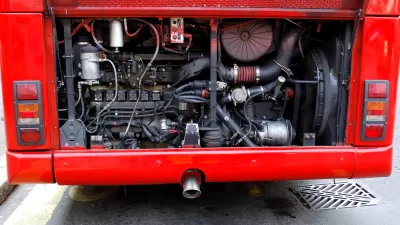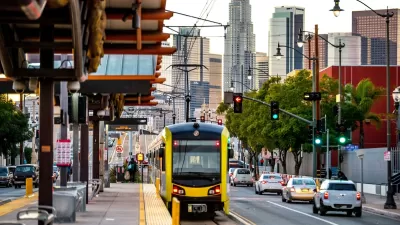The new budget for the State of California cuts $536 million from transit operations. Says Joshua Shaw, executive director of the California Transit Association, 'We will see fare increases. We will see service cuts. We will see layoffs.'
"Of course, the Governor couldn't slash transit funds without the support of the state legislature. While the League of California Environmental Voters, Environmental Defense and the National Resources Defense Council placed the blame at the feet of a "radical minority" of Republicans who used the state's super-majority requirement for any budget to effectively stall democratic efforts, other transit groups blamed the Democratic majority for not not holding firm on protecting the environment.
In the short term, readers should call their legislators and demand that transit funding be restored to the budget. In the long term, the environmental groups want to change the super-majority law so that a small group of legislators can't hijack the entire budget process.
So what does this mean locally? While Metro promised that there would be no fare hikes in the next fiscal year and their proposed service adjustments and cuts are modest compared to previous years; their current budget is balanced assuming that the agency would receive $227 million in operating assistance from the STA."
FULL STORY: Cal Transit Association on State Budget: Armageddon Is Here

Manufactured Crisis: Losing the Nation’s Largest Source of Unsubsidized Affordable Housing
Manufactured housing communities have long been an affordable housing option for millions of people living in the U.S., but that affordability is disappearing rapidly. How did we get here?

Americans May Be Stuck — But Why?
Americans are moving a lot less than they once did, and that is a problem. While Yoni Applebaum, in his highly-publicized article Stuck, gets the reasons badly wrong, it's still important to ask: why are we moving so much less than before?

Research Shows More Roads = More Driving
A national study shows, once again, that increasing road supply induces additional vehicle travel, particularly over the long run.

Judge Halts Enforcement of Anti-Homeless Laws in Grants Pass
The Oregon city will be barred from enforcing two ordinances that prosecute unhoused residents until it increases capacity and accessibility at designated camping sites.

Advancing Sustainability in Los Angeles County Schools
The Los Angeles County Office of Education’s Green Schools Symposium brings together educators, students, and experts to advance sustainability in schools through innovative design, climate resilience strategies, and collaborative learning.

Using Old Oil and Gas Wells for Green Energy Storage
Penn State researchers have found that repurposing abandoned oil and gas wells for geothermal-assisted compressed-air energy storage can boost efficiency, reduce environmental risks, and support clean energy and job transitions.
Urban Design for Planners 1: Software Tools
This six-course series explores essential urban design concepts using open source software and equips planners with the tools they need to participate fully in the urban design process.
Planning for Universal Design
Learn the tools for implementing Universal Design in planning regulations.
City of Moreno Valley
Institute for Housing and Urban Development Studies (IHS)
City of Grandview
Harvard GSD Executive Education
NYU Wagner Graduate School of Public Service
City of Cambridge, Maryland
Newport County Development Council: Connect Greater Newport





























